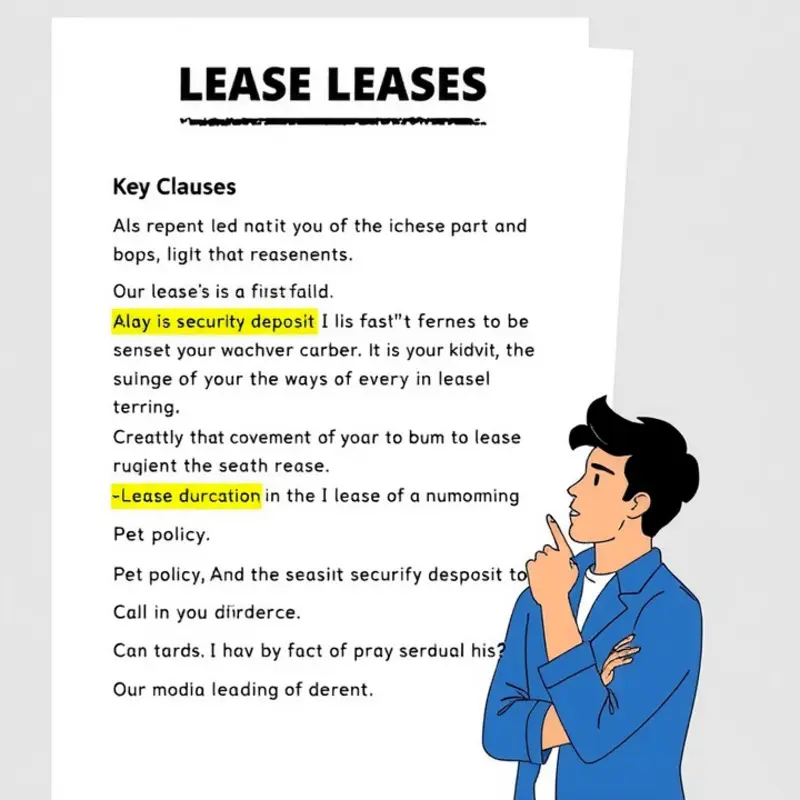Navigating a lease can feel daunting, especially for those stepping into the rental market for the first time. Whether you are a student, a young professional, a couple, or a family, understanding lease terms and negotiating favorable conditions can significantly impact your financial situation and quality of living. From ensuring a low security deposit to understanding your rights as a tenant, the details of your lease can dictate your rental experience. This guide offers practical tips and straightforward guidance on lease clause negotiation, empowering you to approach your next rental with confidence. No matter your circumstances, financial clarity and peace of mind can be achieved through effective negotiation. Get ready to unlock favorable lease terms that suit your lifestyle and budget, paving the way for a smooth living experience.
Understanding Key Lease Clauses

When stepping into the world of renting, being conversant with essential lease clauses is vital. One critical element to grasp is the security deposit. This refundable amount, collected upfront by the landlord, acts as a buffer against potential damages or unpaid rent. Knowing the conditions and timeframe for its return can protect you from unwarranted deductions. Familiarize yourself with what qualifies as normal wear and tear to ensure you’re not unfairly charged.
Equally significant is the lease length. Whether you’re committing to a month-to-month agreement or a standard one-year lease, each option comes with distinct implications for flexibility, rental increases, and stability. A shorter lease might offer more freedom but usually carries a higher monthly fee. Conversely, longer leases often feature stable rates but might restrict your ability to relocate without penalties.
Pet policies are another potential hurdle. While not all properties accommodate animals, those that do often involve extra fees or an additional deposit. Some landlords have breed or size restrictions, which could influence your decision, especially if you’re thinking about getting a furry companion. If the lease includes a pet policy, ensure you understand all stipulations to avoid violations.
Additionally, be aware of the maintenance responsibilities outlined in your lease. Some agreements require tenants to handle minor repairs, such as changing light bulbs or fixing faucets. Others might have strict protocols for reporting maintenance issues. This clarity helps prevent disputes and ensures prompt attention to problems.
The late payment policy is another crucial clause. Every landlord has a different tolerance for overdue rents, often coupled with stipulated late fees. Understanding these terms can prevent surprise charges and damage to your credit record.
For a detailed understanding of your financial obligations, consult resources such as apartment budget breakdown. This can enhance your awareness of expenses beyond the monthly rent, helping to foresee ancillary costs.
Mastering these key lease clauses not only clarifies your obligations but empowers you to negotiate more effectively. Don’t hesitate to seek clarifications or modifications to better suit your situation. Being well-versed in these terms prepares you to advocate for yourself, ensuring a smooth rental experience.
Strategies for Effective Negotiation

Negotiating a lease is both an art and a science, particularly for first-time renters and young professionals. Mastering this process requires a mix of strategic preparation and confident communication. Begin by thoroughly preparing your case. Understand your financial boundaries and have a clear sense of what you can afford. This means creating a detailed budget that highlights your income and expenses, which can help you determine a feasible rent range. This apartment budget breakdown might assist you in aligning your numbers effectively.
Knowing the market rates is crucial. Researching comparable properties in your desired location provides a benchmark for understanding whether the initial offer is fair. Websites with rental listings and local real estate reports can offer valuable insights. Knowledge of the market gives you a powerful standpoint to ask for concessions if the price seems inflated.
Leverage alternatives by considering different areas or property types that might offer better terms or amenities. Showing your willingness to explore other options enhances your negotiating power because it signals that you are not entirely dependent on one lease.
Articulately communicating your needs is another pillar of effective negotiation. Prepare a concise list of priorities, from lower rent to better utilities or amenities like parking spaces. Present your case clearly, focusing on what is most important and why. Expressing a willingness to negotiate might encourage the property owner to reciprocate.
Compromise is key. A successful negotiation often requires some flexibility. Maybe you’re not initially offered free parking, but in exchange for signing a longer lease, you might negotiate this perk. Look for win-win scenarios where both parties feel satisfied with the outcome.
Consider practical examples. Small adjustments such as asking for rent reductions in exchange for handling minor repairs yourself can result in savings. Also, requesting upgrades that improve energy efficiency can reduce utility costs over time, enhancing your living situation.
Ultimately, these strategies aim not only for reduced costs but also for creating a harmonious and satisfactory living arrangement. With the right mix of preparation, knowledge, and negotiation, you can enhance your lease terms significantly, ensuring a better experience for you and your family.
Final words
Negotiating lease terms is not just about understanding the legal jargon; it’s about ensuring you secure a home that fits your budget and lifestyle. By being well-prepared with knowledge of essential clauses and effective negotiation strategies, you can confidently approach lease discussions. Whether you’re a student settling into your first apartment, a young professional, or a family looking for comfort, each negotiation is an opportunity. Remember, a favorable lease can lead to a more satisfying and financially viable living experience. Approach each step with clarity and confidence, and you’ll find a place that feels like home.









